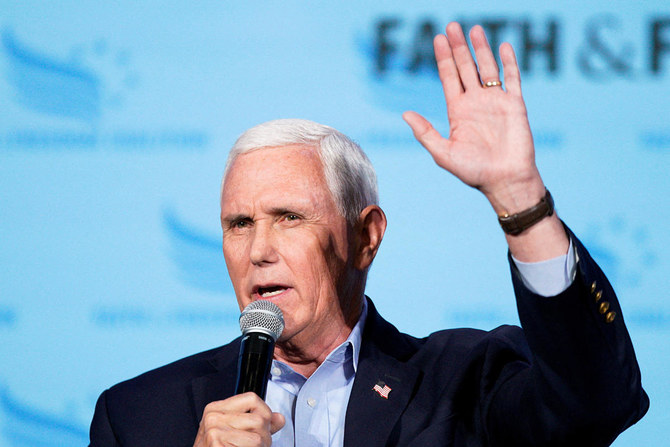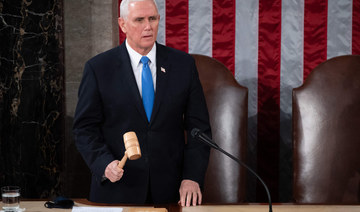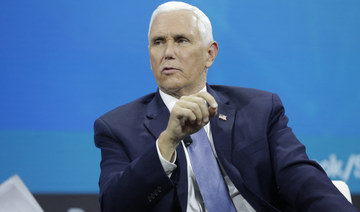WASHINGTON: Republican former vice president Mike Pence launched his bid for the 2024 presidential nomination on Monday, offering a traditionalist alternative to the battle royale being waged by populists Donald Trump and Ron DeSantis.
The evangelical Christian filed his paperwork with the Federal Election Commission ahead of an official declaration Wednesday in the early voting state of Iowa — joining an already crowded field.
Pence, 63, honed his reputation as an unstintingly loyal deputy who stuck with Trump throughout a scandal-plagued four years and brought the religious right into the tent.
But he became a pariah in Trumpworld after rejecting the Republican leader’s demands that he overturn the 2020 election in his role as president of the Senate.
Berated constantly by Trump after Joe Biden’s victory — and even heckled at a conservative conference with chants of “traitor!” — Pence continued to praise the tycoon in public.
That eventually changed after Trump’s torrent of false claims of election fraud led to a mob chanting for Pence to be hanged at the US Capitol.
Pence has spent much of the last two years touring early-nominating states such as Iowa and New Hampshire to reinforce his political vision as a “Christian, conservative, Republican — in that order.”
His entry doesn’t much change the dynamics of the race, which is divided into three lanes — runaway leader Donald Trump, Trump’s closest rival and sitting Florida governor DeSantis, and everyone else.
Pence is framing himself as a traditional Republican, concerned with fiscal responsibility and family values, who can deliver Trump’s economic policies without the drama.
But he has also pointed to some clear blue water between the pair, as he allies himself strongly with Ukraine and refuses to rule out cuts to welfare payments.
While his politics are popular among Republicans, critics question whether Pence has a constituency in a party that is more focused now on populism and cultural politics than traditional conservatism.
And voters sympathetic to his decision to stand up for the Constitution have other candidate choices, such as the proselytizing Christian Tim Scott who do not bring with them the baggage of the Trump years.
“We all give (Pence) credit for certifying the election,” Republican strategist Sarah Longwell told Politico.
“But he also stood next to Donald Trump and normalized and validated him for four years while Trump ran roughshod over the presidency.”
DeSantis has consistently been polling almost 20 points above Pence and is hoping to outflank Trump from the right.
But the Florida governor’s poor showing in head-to-head polls has opened the floodgates, with Chris Christie due to announce on Tuesday, joining former governors Nikki Haley, Asa Hutchinson and Doug Burgum in the race.
Like Haley and DeSantis, Pence has appeared determined to avoid conflict with Trump in hopes of wooing his former supporters should the cascade of criminal investigations targeting the former president take him out of the race.
The lower-ranked candidates have also pointed out that there is a long way to go in the race, and that Trump was trailing in the low single digits at this point in the 2016 cycle.
Democrats watching from the sidelines pointed to Pence’s socially conservative agenda as an abortion hard-liner who has opposed same-sex marriage as evidence that he would drag the contest to the right.
“In Mike Pence’s own words, he was a member of the extreme Tea Party ‘before it was cool,’ and he hasn’t slowed down since,” said Democratic National Committee Chair Jaime Harrison.
Zee Cohen-Sanchez, a left-leaning election strategist who has worked with progressives like Bernie Sanders, said Pence’s break with Trump over the insurrection was a double-edged sword.
“Despite allegations and charges against Trump, his base remains strong and given Pence essentially turned against Trump, these voters will not support him,” she told AFP.
“The majority of other Republicans support DeSantis, who has a track record conservatives are excited about and they see him as a powerful alternative to Trump.”













